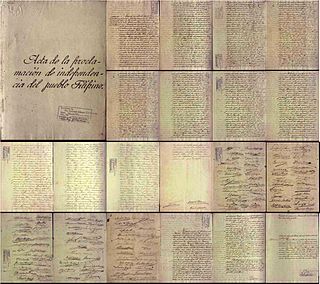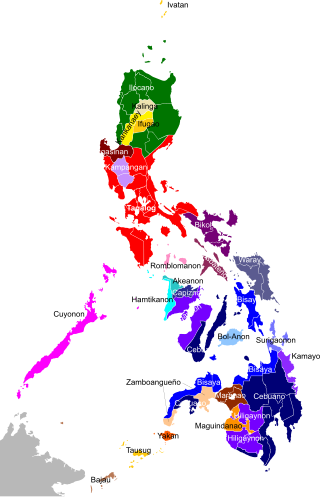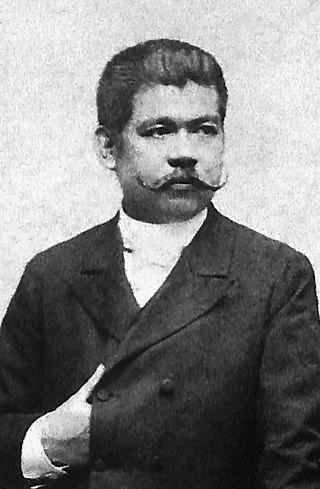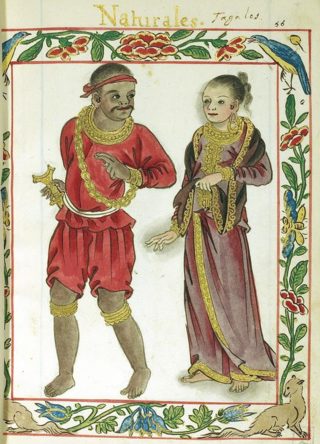Vicente L. Rafael | |
|---|---|
| Born | Feb. 16, 1956 |
| Citizenship | Dual, Filipino/American |
| Known for | Contracting Colonialism; "White Love"; The Promise of the Foreign"; "Motherless Tongues"; "The Sovereign Trickster" |
| Awards | Guggenheim Fellowship; Grant Goodman Award; Rockefeller Fellowship, Bellagio; Humanities Research Institute, UCI; Philippine National Book Award (1988, 2000), Gawad Pambansang Alagad ni Balagtas (2017) among others. |
| Academic background | |
| Alma mater | Ateneo de Manila (B.A.) Cornell University (Ph.D.) |
| Doctoral advisor | David Wyatt; James T. Siegel; Dominick LaCapra; Benedict Anderson |
| Academic work | |
| Discipline | Southeast Asian Studies,History |
| Institutions | University of Washington,Seattle |
Vicente L. Rafael is a professor of Southeast Asian history at the University of Washington,Seattle. He received his B.A. in history and philosophy from Ateneo de Manila University in 1977 and his Ph.D. in history at Cornell University in 1984. Prior to teaching at the University of Washington,Rafael taught at the University of California,San Diego and the University of Hawaii at Manoa. Currently,he sits on advisory boards of Cultural Anthropology,Public Culture,and positions.
Rafael has researched and taught on Southeast Asia,particularly the Philippines,comparative colonialism,particularly of Spain and the United States,and comparative nationalism. Though a historian,he has also focused on the related fields of cultural anthropology and literary studies and pursued topics ranging from language and power,translation and religious conversion,technology and humanity,and the politics and poetics of representation.
In 1993,Duke University Press published Contracting Colonialism:Translation and Christian Conversion in Tagalog Society Under Early Spanish Rule,in which Rafael examined the role of language and translation in the religious conversion of Tagalogs to Catholicism during the early period of Spanish rule of the Philippines. In 1995,Temple University Press published a collection he edited entitled Discrepant Histories:Translocal Essays on Filipino Cultures that studied a number of issues in the formation of the Philippine nation-state and translocal Filipino cultures. [1] In 1999,Cornell University Press published Figures of Criminality in Indonesia,the Philippines,and Colonial Vietnam,a collection of essays on the relationships between criminality and colonial state formation. [2] In 2000,Duke University Press published his White Love and Other Events in Filipino History,a challenging of traditional,epic narratives of Filipino history and especially the emergence of revolutionary nationalism. [3] The Promise of the Foreign:Nationalism and the Technics of Translation in the Spanish Philippines,also published by Duke University Press,appeared in 2005 and is the second volume of Contracting Colonialism. Its main argument is that translation was crucial to the emergence of Filipino nationalism,a mechanism from which was issued the promise of nationhood. [4] This book was followed by "Motherless Tongues:The Insurgency of Language Amid Wars of Translation",also published by Duke UP in 2016 which delved into topics ranging from the colonial introduction of English in the Philippines to the fate of interpreters in Iraq during wartime. Rafael also wrote the introduction to a volume of the works by Nick Joaquin,"The Woman Who Had Two Navels and Tales of the Tropical Gothic" which came out in 2017 from Penguin Classics. Most recently in 2022,he published "The Sovereign Trickster:Death and Laughter in the Age of Duterte" which offers what he calls a "prismatic history" of the social conditions and historical contexts for understanding the regime of Rodrigo Duterte,also published by Duke UP.
A colonial mentality is the internalized attitude of ethnic or cultural inferiority felt by people as a result of colonization, i.e. them being colonized by another group. It corresponds with the belief that the cultural values of the colonizer are inherently superior to one's own. The term has been used by postcolonial scholars to discuss the transgenerational effects of colonialism present in former colonies following decolonization. It is commonly used as an operational concept for framing ideological domination in historical colonial experiences. In psychology colonial mentality has been used to explain instances of collective depression, anxiety, and other widespread mental health issues in populations that have experienced colonization.

Spanish was the official language of the Philippines from the beginning of Spanish rule in the late 16th century, through the Philippine–American War (1899-1902) and subsequent United States colonization and remained co-official after independence in 1946, along with Filipino and English, until 1973. Its status was initially removed in 1973 by a constitutional change, but after a few months it was re-designated an official language again by a presidential decree. With the present Constitution, Spanish became designated as an auxiliary or "optional and voluntary language".

Filipinos are citizens or people identified with the country of the Philippines. The majority of Filipinos today come from various Austronesian ethnolinguistic groups, all typically speaking Filipino, English, and/or other Philippine languages. Currently, there are more than 185 ethnolinguistic groups in the Philippines; each with its own language, identity, culture, and history.

The Philippines is inhabited by more than 182 ethnolinguistic groups, many of which are classified as "Indigenous Peoples" under the country's Indigenous Peoples' Rights Act of 1997. Traditionally-Muslim peoples from the southernmost island group of Mindanao are usually categorized together as Moro peoples, whether they are classified as Indigenous peoples or not. About 142 are classified as non-Muslim Indigenous People groups, and about 19 ethnolinguistic groups are classified as neither indigenous nor moro. Various migrant groups have also had a significant presence throughout the country's history.
Philippine literature in Spanish is a body of literature made by Filipino writers in the Spanish language. Today, this corpus is the third largest in the whole corpus of Philippine literature. It is slightly larger than the Philippine literature in the vernacular languages. However, because of the very few additions to it in the past 30 years, it is expected that the former will soon overtake its rank.
Global feminism is a feminist theory closely aligned with post-colonial theory and postcolonial feminism. It concerns itself primarily with the forward movement of women's rights on a global scale. Using different historical lenses from the legacy of colonialism, global feminists adopt global causes and start movements which seek to dismantle what they argue are the currently predominant structures of global patriarchy. Global feminism is also known as world feminism and international feminism.

Agimat, also known as anting or folklorized as anting-anting, is a Filipino word for "amulet" or "charm". Anting-anting is also a Filipino system of magic and sorcery with special use of the above-mentioned talismans, amulets, and charms. Other general terms for agimat include Virtud (Virtue) and galing (Prowess).

In early Philippine history, the Tagalog settlement at Tondo was a major trade hub located on the northern part of the Pasig River delta, on Luzon island. Together with Maynila, the polity (bayan) that was also situated on the southern part of the Pasig River delta, had established a shared monopoly on the trade of Chinese goods throughout the rest of the Philippine archipelago, making it an established force in trade throughout Southeast Asia and East Asia.

There have been several names of the Philippines in different cultures and at different times, usually in reference to specific island groups within the current archipelago. Even the name Philippines itself was originally intended to apply only to Leyte, Samar, and nearby islands. It was bestowed by the Spanish explorer Ruy López de Villalobos or one of his captains Bernardo de la Torre in 1543 in honor of the crown prince Philip, later Philip II. Mindanao, which they reached first and assumed to be the greater land, they named after the reigning emperor Charles V, who was also Spain's king Carlos I. Over the course of Spanish colonization, the name was eventually extended to cover the entire chain. It has survived with minor changes. The Philippine Revolution called its state the Philippine Republic. The US military and civilian occupations called their territory the Philippine Islands. During the Third Philippine Republic, the state's official name was formally changed to the Philippines.
John Pemberton is an associate professor of anthropology at Columbia University. He received a Ph.D. from Cornell University after doing undergraduate and Masters' work at Wesleyan University and being associated with the music program at California Institute for the Arts. He grew up in Amherst, Massachusetts, where his father taught at the college. Prior to joining the faculty at Columbia, Pemberton taught at the University of Washington.

Marcelo Hilario del Pilar y Gatmaitán, commonly known as Marcelo H. del Pilar and also known by his pen name Pláridel, was a Filipino writer, lawyer, journalist, and freemason. Del Pilar, along with José Rizal and Graciano López Jaena, became known as the leaders of the Reform Movement in Spain.

José Protasio Rizal Mercado y Alonso Realonda was a Filipino nationalist, writer and polymath active at the end of the Spanish colonial period of the Philippines. He is considered the national hero of the Philippines. An ophthalmologist by profession, Rizal became a writer and a key member of the Filipino Propaganda Movement, which advocated political reforms for the colony under Spain.

The maharlika were the feudal warrior class in ancient Tagalog society in Luzon, the Philippines. They belonged to the lower nobility class similar to the timawa of the Visayan people. In modern Filipino, however, the word referred to aristocrats or to royal nobility, which was actually restricted to the hereditary maginoo class.
The Southeast Asia Program (SEAP) was founded in 1950 to promote the acquisition and dissemination of knowledge about countries, cultures and languages of the region. It is an interdisciplinary program of Cornell University that focuses on the development of graduate training and research opportunities on the languages and cultures of Brunei, Burma, Cambodia, Indonesia, Laos, Malaysia, the Philippines, Singapore, Thailand, and Vietnam. Cornell is known for being the "Mecca of Southeast Asian Studies."

Tagalog profanity can refer to a wide range of offensive, blasphemous, and taboo words or expressions in the Tagalog language of the Philippines. Due to Filipino culture, expressions which may sound benign when translated back to English can cause great offense; while some expressions English speakers might take great offense to can sound benign to a Tagalog speaker. Filipino, the national language of the Philippines, is the standard register of Tagalog, so as such the terms Filipino profanity and Filipino swear words are sometimes also employed.
A revolutionary government or provisional government has been declared a number of times in the Philippines by insurgent groups.
J. Kēhaulani Kauanui is a Kanaka Maoli woman born and raised in California with ties to family in Anahola on the island of Kaua`i and throughout the islands. She is an author, editor, radio producer, educator, serves on advisory boards, and is one of six co-founders of the Native American and Indigenous Studies Association (NAISA). She was awarded a Fulbright (1994-1995) at the University of Auckland in New Zealand where she was affiliated with the Māori Studies department. Her research areas focus on indigeneity and race, settler colonialism, decolonization, anarchism, and gender and sexuality.
Reynaldo "Rey" Clemeña Ileto is a Filipino historian known for his seminal work Pasyon and Revolution: Popular Movements in the Philippines, 1840–1910 first published in 1979. Ileto specializes in Asian history, religion and society, postcolonial studies, and the government and politics of Asia and the Pacific. He is known for his interdisciplinary approach combining history, literature, anthropology, cultural studies, and politics.

The historiography of the Philippines includes historical and archival research and writing on the history of the Philippine archipelago including the islands of Luzon, Visayas, and Mindanao.